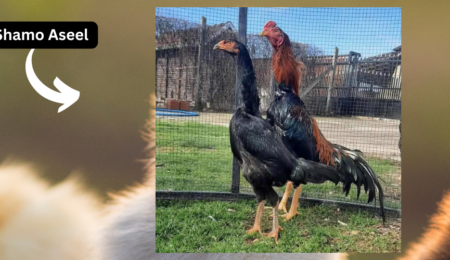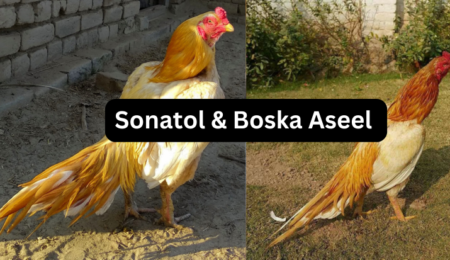Care and living conditions:
For the proper care of chicks, the most important factor is maintaining the correct temperature. After that, their diet and then humidity are crucial. These three factors need to be adjusted according to the chick’s age. Therefore, anyone raising chicks should know the appropriate temperature, humidity levels, and type of diet required at each stage of the chick’s development to ensure they grow well and lead a healthy life. The same care applies to Aseel chicks, Desi chicks, and Fansi chicks.
- Necessities of life:
It is essential that the brooder for small chicks be spacious enough for them to move around easily inside it. They should not face any difficulties; otherwise, they may suffer from stress, which can lead to their loss. Additionally, the temperature should be between 30 and 35 degrees Celsius if the chicks are one week old. As the chicks grow, it is necessary to gradually reduce the temperature so that they don’t feel too hot.
- Protect from summer or winter:
It’s very important to protect small chicks from both heat and cold. This is because in cold weather, there is a high risk of the chicks getting too cold, while in hot weather, it’s essential to keep them at a normal temperature. In both hot and cold seasons, maintaining a room temperature of around 30 degrees Celsius is crucial. The temperature should not be too low or too high so that the chicks can remain comfortable and healthy, without any health issues arising.
- Bedding materials for small chicks:
The best bedding material for small chicks is wood. However, it can be either in powder form or slightly larger than powder, and there won’t be an issue. But it’s essential that wood be used underneath them to help maintain their body temperature. This is crucial because if the body temperature of the small chicks is not maintained, they can develop a fever, which could potentially be fatal.
Food & Nutrition:
When it comes to feeding chicks, you can provide any type of food you prefer without any issues, but it’s important to keep in mind that their diet must contain adequate amounts of vitamins, proteins, and calcium. If any of these three nutrients are found in insufficient quantities in their diet, your chicks may become ill. It’s also possible that your chicks might not show immediate signs of illness but could gradually weaken over time. By the time you notice the issue at a later stage, it may be difficult to save the chicks.
Try to feed them twice a day, providing just enough food that they can easily consume. Once they’ve eaten, remove any leftover food to prevent waste. Also, use containers that minimize the chance of the chicks spilling or wasting their food.
In addition to food, it’s crucial to ensure that they have constant access to water, whether it’s summer or winter. Water should always be available to prevent dehydration. It’s also very important to clean the water containers daily and refresh the water at least once a day.
Brooder Setup:
| Component | Details |
|---|---|
| Brooder | Circular, expandable, 3-4 sq. ft. per chick, warm, draft-free. |
| Heat Lamp | Hang 20 inches above litter, maintain 95°F in the comfort zone, reduce by 5°F weekly to a minimum of 55°F. |
| Bedding | Use 3-4 inches of absorbent wood shavings, avoid cedar shavings, replace wet bedding daily. |
| Lights | 18-22 hours of light in the first week, then reduce to 16 hours. Use a 40-watt bulb per 100 sq. ft. |
| Feeders | 4 linear inches per bird, clean egg cartons for young chicks, transition to low-lying or trough feeders. |
| Waterers | Two 1-quart waterers per 25 chicks, placed outside the comfort zone, fill 24 hours prior to chick arrival. |
Treatment of diseases:
For small Aseel or desi chicks, the most common illness is fever. Fever in small chicks can occur due to changes in weather or fluctuations in temperature. Sometimes, it can also be due to changes in the air. Therefore, we cannot attribute fever to just one cause, as there can be many reasons for it.
Hence, you should choose a good vaccine and use it according to the vaccination schedule. This will help strengthen the immune system of your chicks and protect them from minor illnesses.
To prevent internal parasites, it is important to use internal insect killer medicine. If you use this medicine in water, it can yield better results. Similarly, for external parasites, it is crucial to clean the area where the chicks live thoroughly so that insects do not breed there. At least once a week, you should clean their living area to prevent insect infestations. If insects do infest and your chicks are becoming weak due to them, you should use an anti-insect killer, which can be in spray or powder form. However, powder is generally better for small chicks.
Growth and development:
For the growth of chicks, it’s best to provide a balanced feed that includes essential nutrients like vitamins, proteins, calcium, and iron, rather than giving these nutrients separately. Choosing a feed that contains all these components ensures that the chicks’ nutritional needs are met. Additionally, as the chicks age, it’s important to observe if any of them appear weak. If you notice a chick becoming weak, it should be separated and treated immediately. Also, regularly check their weight, as it changes with age. Knowing the recommended weight for chicks at different ages is crucial.
Record Keeping:
It is also necessary for you to have a record of everything related to chicks.
- Vaccination Record: It’s important to keep a record of your pets‘ vaccinations, including when they received each vaccine and when the next dose is due.
- Treatments Record: Maintain a record of any treatments your pets have received, including details on what treatments were administered and the associated costs.
- Health Issues Record: Additionally, keep a record of any health issues your pets have experienced, noting what problems occurred and at what age. This can help in planning preventative measures for future issues.
Legal and Ethical Discourse:
If you want to become a successful poultry farmer, it’s essential for you to gain knowledge related to farming so that you are aware of how to solve any upcoming issues. If you are unable to acquire this knowledge, you should stay in touch with a good veterinarian who can provide you with advice and recommend appropriate medicine in case of any emergency. This will help you avoid potential losses.
Emergency Care:
For the emergency care of chicks, it is essential to have all the necessary medicines available for use in emergencies. In addition, it is crucial to have the skills to handle emergency situations.
Conclusion:
If you follow all the points mentioned above regarding the care of small animals, you can become a good farmer in the future.






